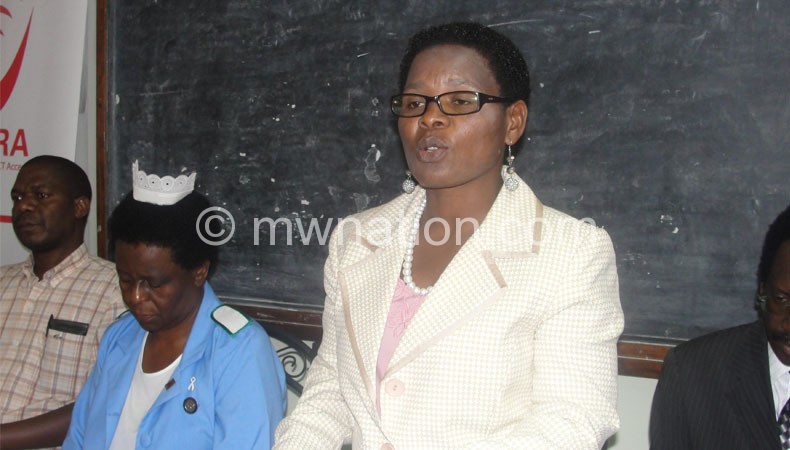Taming fistula from grass roots
Tomorrow, Malawi joins the world in commemorating the International Fistula Day under the theme Women’s Dignity Begins When Fistula Ends. I explore Malawi’s journey towards winning the fistula battle.
——————————————
Rachel Labada, 32, of Kanyenga Village in Traditional Authority (T/A) Mavwele in Mchinji believes fistula is the end of a woman’s dignity. She says her two years of struggling with fistula between 2011 and 2013 were living hell.
“I could not be among friends for hours,” she recalls. “Urine stinks a lot and every 30 minutes I could feel I am wet and this made me feel very uncomfortable to be among people.”
The mother of three says it all started in December 2011 when she had a stillbirth after a prolonged labour.
When she observed that she was getting wet frequently, she says she thought the liquids are part of the process of giving birth.
“It took me days to notice the liquid was actually urine, but I had no idea what had happened and so I decided to wait, hoping it would stop with time,” says Labada.
Little did she know that this was the beginning of her life with obstetric fistula, a condition that is caused by prolonged labour due to lack of timely and adequate medical care. This creates a hole in the birth canal, leaving the muscles that control urine or faeces flow loose. The condition is also common among young girls with early pregnancies as their bodies are immature.

She blames her condition on scarcity of health centres in her district.
“I remember my labour started around midnight. The nearby health centre is almost six kilometers away from my house and I could not walk there in the night,” she explains.
Her option was to visit a nearby traditional birth attendant (TBA). Unfortunately, the TBA did not handle her situation properly, resulting in prolonged labour and a stillbirth.
Although she had fistula, Libada met a man who married her.
“Everything was done as per our tradition that we married. I did my best to keep myself clean and attractive.
“However, as time went by, the man noticed my problem. I struggled to keep myself clean when we are on long trips or during the night because slowly, the problem became worse to the point that in every 10 minutes, I had to change clothes. My husband noticed and when he asked me, I told him the truth,” she says.
After that, Libada says the man started sleeping out and eventually stopped coming to her house.
The Standard Eight dropout, who is now based in Lunzu, Blantyre, experienced what hundreds of women with fistula face as a result of the condition—loss of self-esteem and dignity, isolation and other physical challenges.
But, like Libada, a number of women have now been repaired and reclaimed their lost dignity. Malawi’s central hospitals of Zomba, Queen Elizabeth, Kamuzu and Mzuzu, and a few other hospitals offer fistula surgery.

“I was worried when I became pregnant last year, but I delivered successfully and the problem has not reappeared,” says Libada.
As Malawi joins the world in commemorating the International Fistula Day tomorrow, it is time to reflect on stories such as Libada’s and review the impact that interventions against fistula have yielded.
Spokesperson for Ministry Health Adrian Chikumbe says the fight against fistula should be won and that government records show tremendous success.
“The approach is to make sure there is treatment and sensitisation of the public. Government wants to ensure everyone is aware that fistula is a treatable condition and that patients should not be discriminated against,” says Chikumbe.
He says while only 51 clients were successfully repaired in 2007, over 500 were operated on in 2014.
“Often, women with obstetric fistula are prone stigma and ridicule. This year’s theme aims at reducing such stigma and increasing public understanding on the condition. It strives to urge communities to respect and encourage women with obstetric fistula to have hope and seek appropriate care and treatment,” says Chikumbe.
Former UNFPA country representative, Athanise Nzokirikishaka told The Nation of June 7 2013 that while industralised countries have eliminated fistula, an estimated two to three million women and girls are still living with it in developing countries such as Malawi. He said globally, 50 000 new fistula cases occur each year.
However, fistula treatment is not accessible to all as currently, only central hospitals and a few selected hospitals perform fistula operations, with a larger number being reached through UNFPA annual fistula camps.
Chikumbe attributes it to lack of trained personnel to carry the operation.
He says special training is required for one to perform the operation.
“Not all health facilities can provide the service. We are making progress and looking forward to a day all district hospitals will be offering the service,” he says.
However, Malawi Health Equity Network (Mhen) executive director Martha Kwataine asks government to come up with a short and long-term solution to obstetric fistula, saying it needs focus and proper planning.
“An immediate action should be for government to come up with a collaboration programme between district health offices [DHOs] and central hospitals. Each DHO should identify people in need of fistula treatment and liaise with the central hospital to take these patients for treatment,” she says, adding this will help everyone to access the treatment.
In the long term, Kwataine says, government should set a target when all hospitals should be able to treat every woman with fistula.
“This can be done by training more doctors to carry out operations and procure operation equipment for all hospitals,” says Kwataine.





